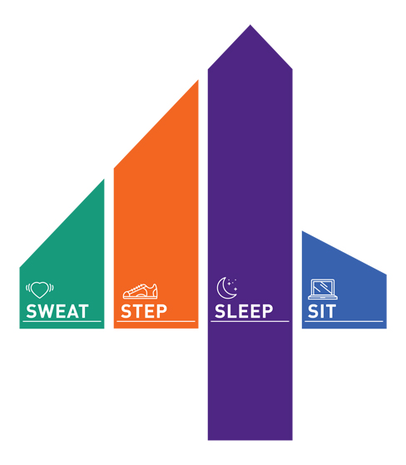Being active helps to improve your physical and mental well-being. It also reduces your risk of chronic diseases such as type 2 diabetes, high blood pressure, heart attacks, strokes, and types of cancer.
|
Canadian 24-Hour Movement Guidelines: Youth and Adults A healthy 24 hours includes physical activity, sedentary behaviour, healthy eating, and sleep: Move More
Sit Less
|
What do we mean by moderate to vigorous activity? Any activity that increases your heart rate and makes you feel warmer.
Here are a few examples:
- Fast walking
- Biking
- Lacrosse
- Hockey
- Basketball
- Running
- Swimming
- Hiking
- Snowshoeing
- Skating
- Cross-country skiing
- Etc.
You can split the 150 minutes as you want! If shorter sessions (e.g., 10-15mins) fit better in your schedule. You just need to incorporate more of them in your week.
TIPS TO GET STARTED:
- Set goals:
- It is motivating to identify the reasons why we want to move more
- Setting short-term and long-term goals can keep you focused and motivated
- Goals should be attainable and measurable
- Buddy up:
- Having someone to move with can be more fun and motivating
- Bring friends and/or family members on board with you
- Find activities that you enjoy:
- Physical activity can be fun
- Start with simple changes:
- Physical activity does not have to be complicated
- Use the stairs instead of the elevators and escalators. Park the car a little further at the grocery store. Get off the bus a couple stops early to walk the rest
- Including more of those small changes can go a long way
- Put physical activity in your schedule:
- Block time for physical activity each day
- It makes you more likely to act and to form habits
- Consider a pedometer:
- Pedometers are simple to use. There are watch/portable devices (Fitbit, etc.) but there are also apps that you can use on your cell phone.
- Using a pedometer increases physical activity and better health
- The optimal number of steps per day is around 10,000 but aim for weekly increases that are achievable for you. 10,000 steps is equivalent to approximately 1h30 of walking, depending on your walking speed, but you accumulate some just by walking around during the day.
- Any extra movement counts!
- Prepare for obstacles:
- There will be times when it will be more difficult to be active (busy weeks, bad weather, vacations, lack of motivation, etc.)
- Identify those obstacles in advance and see how you can adapt to them. You will be more likely to maintain your good habits

